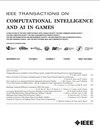网络游戏用户信任系统——第二部分:信任推理的主观逻辑方法
Q2 Computer Science
IEEE Transactions on Computational Intelligence and AI in Games
Pub Date : 2017-12-01
DOI:10.1109/TCIAIG.2016.2593000
引用次数: 7
摘要
在包括网络游戏在内的虚拟世界中,从用户的角度表示、操纵和推断信任无疑是一个巨大的挑战。当某人遇到一个不知名的人时,问题是“我能信任他/她吗?”这要求用户能够访问对他人的信任表示,以及一组操作员来推断其他用户/参与者的可信任性。在本文中,我们使用从世界数据生成的信任表示来为个人的信任决策提供信息。为了实现这一目的,我们假设这种信任的表示已经存在;事实上,这是在我们的另一篇论文中提出的。因此,这里的重点是推断其他用户/玩家的可信任性所需的信任机制。更具体地说,我们使用部署为信任网络的个人信任表示作为推理机制的基础,该推理机制使用两个主观逻辑算子(一致性和折扣)来自动推导信任决策。所提出的信任推理系统已通过OpenSimulator场景进行了验证,与参考场景(无信任)相比,化身的可信任性提高了5%。本文章由计算机程序翻译,如有差异,请以英文原文为准。
A User Trust System for Online Games—Part II: A Subjective Logic Approach for Trust Inference
Representing, manipulating, and inferring trust from the user point of view certainly is a grand challenge in virtual worlds, including online games. When someone meets an unknown individual, the question is “Can I trust him/her or not?” This requires the user to have access to a representation of trust about others, as well as a set of operators to undertake inference about the trustability of other users/players. In this paper, we employ a trust representation generated from in-world data in order to feed individual trust decisions. To achieve that purpose, we assume that such a representation of trust already exists; in fact, it was proposed in another paper of ours. Thus, the focus here is on the trust mechanisms required to infer trustability of other users/players. More specifically, we use an individual trust representation deployed as a trust network as base to the inference mechanism that employs two subjective logic operators (consensus and discount) to automatically derive trust decisions. The proposed trust inference system has been validated through OpenSimulator scenarios, which has led to a 5% increase on trustability of avatars in relation to the reference scenario (without trust).
求助全文
通过发布文献求助,成功后即可免费获取论文全文。
去求助
来源期刊

IEEE Transactions on Computational Intelligence and AI in Games
COMPUTER SCIENCE, ARTIFICIAL INTELLIGENCE-COMPUTER SCIENCE, SOFTWARE ENGINEERING
CiteScore
4.60
自引率
0.00%
发文量
0
审稿时长
>12 weeks
期刊介绍:
Cessation. The IEEE Transactions on Computational Intelligence and AI in Games (T-CIAIG) publishes archival journal quality original papers in computational intelligence and related areas in artificial intelligence applied to games, including but not limited to videogames, mathematical games, human–computer interactions in games, and games involving physical objects. Emphasis is placed on the use of these methods to improve performance in and understanding of the dynamics of games, as well as gaining insight into the properties of the methods as applied to games. It also includes using games as a platform for building intelligent embedded agents for the real world. Papers connecting games to all areas of computational intelligence and traditional AI are considered.
 求助内容:
求助内容: 应助结果提醒方式:
应助结果提醒方式:


